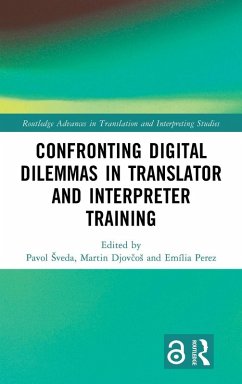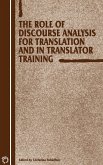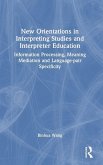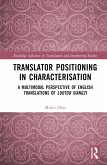Confronting Digital Dilemmas in Translator and Interpreter Training
Herausgeber: ¿Veda, Pavol; Perez, Emília; Djov¿o¿, Martin
Confronting Digital Dilemmas in Translator and Interpreter Training
Herausgeber: ¿Veda, Pavol; Perez, Emília; Djov¿o¿, Martin
- Gebundenes Buch
- Merkliste
- Auf die Merkliste
- Bewerten Bewerten
- Teilen
- Produkt teilen
- Produkterinnerung
- Produkterinnerung
This collection explores the challenges and opportunities brought on by developments in emergent technologies for translator and interpreter training.
Andere Kunden interessierten sich auch für
![Fit-For-Market Translator and Interpreter Training in a Digital Age Fit-For-Market Translator and Interpreter Training in a Digital Age]() Fit-For-Market Translator and Interpreter Training in a Digital Age54,99 €
Fit-For-Market Translator and Interpreter Training in a Digital Age54,99 €![Translator and Interpreter Training Translator and Interpreter Training]() Translator and Interpreter Training205,99 €
Translator and Interpreter Training205,99 €![Global Trends in Translator and Interpreter Training Global Trends in Translator and Interpreter Training]() Global Trends in Translator and Interpreter Training206,99 €
Global Trends in Translator and Interpreter Training206,99 €![The Role of Discourse Analysis for Translation and Translator Training The Role of Discourse Analysis for Translation and Translator Training]() The Role of Discourse Analysis for Translation and Translator Training88,99 €
The Role of Discourse Analysis for Translation and Translator Training88,99 €![New Orientations in Interpreting Studies and Interpreter Education New Orientations in Interpreting Studies and Interpreter Education]() Binhua WangNew Orientations in Interpreting Studies and Interpreter Education176,99 €
Binhua WangNew Orientations in Interpreting Studies and Interpreter Education176,99 €![Translator Positioning in Characterisation Translator Positioning in Characterisation]() Minru ZhaoTranslator Positioning in Characterisation148,99 €
Minru ZhaoTranslator Positioning in Characterisation148,99 €![Working as a Professional Translator Working as a Professional Translator]() Jc PenetWorking as a Professional Translator171,99 €
Jc PenetWorking as a Professional Translator171,99 €-
-
-
This collection explores the challenges and opportunities brought on by developments in emergent technologies for translator and interpreter training.
Produktdetails
- Produktdetails
- Verlag: Routledge
- Seitenzahl: 276
- Erscheinungstermin: 3. November 2025
- Englisch
- Abmessung: 235mm x 157mm x 19mm
- Gewicht: 554g
- ISBN-13: 9781032913124
- ISBN-10: 1032913126
- Artikelnr.: 74874072
- Herstellerkennzeichnung
- Libri GmbH
- Europaallee 1
- 36244 Bad Hersfeld
- gpsr@libri.de
- Verlag: Routledge
- Seitenzahl: 276
- Erscheinungstermin: 3. November 2025
- Englisch
- Abmessung: 235mm x 157mm x 19mm
- Gewicht: 554g
- ISBN-13: 9781032913124
- ISBN-10: 1032913126
- Artikelnr.: 74874072
- Herstellerkennzeichnung
- Libri GmbH
- Europaallee 1
- 36244 Bad Hersfeld
- gpsr@libri.de
Pavol veda is Associate Professor at the Department of British and American Studies at the Comenius University in Bratislava, Slovakia. Martin Djov¿o is Associate Professor at the Department of British and American Studies at the Matej Bel University in Banská Bystrica, Slovakia. Emília Perez is Associate Professor at the Department of Translation Studies at Constantine the Philosopher University in Nitra, Slovakia.
Part I: Theoretical Foundations and Pedagogical Innovations 1. Confronting Digital Dilemmas - Humans are here to stay Pavol veda, Martin Djov
o and Emília Perez 2. Translation Technologies as the End of Translation as We Know It. Empiricism as a Search for a Way Forward Anthony Pym 3. Bridges or Walls? How Translation Technology Implementation Shapes Digital Divides David Orrego-Carmona 4. Translator Education for the Reality Yet to Come: Translator Competence Development as a Complex System Karolina Levanait
Part II. Technological Integration and Professional Practice 5. Rethinking University Curricula in Translation and Interpreting. Insights from a survey on T&I graduates Paola Gentile 6. Working Alongside the Machines: Interpreting as Humans When computers can do our Jobs Jonathan Downie 7. AI Literacy as a Key Factor in Upskilling Translators and Increasing Job Satisfaction João Brogueira 8. Adopting AI Tools: Implications for Technical Competence Development in Slovak Translator Education Ivo Polá
ek and Lucia Tonková Part III. Social Implications and Interactive Learning 9. Towards a sociocentric approach in translator and interpreter education Martin Djov
o 10. Media Accessibility Educators in the Era of Digital Transformation - finding a home within translation studies Emília Perez and Alina Secar
11. Immersive Learning Experiences: Harnessing the Power of Podcasts and Interactive Stories in Community Interpreter Training for Humanitarian Contexts Barbara Heinisch 12. Remote interpreting and student stress in hybrid training environments Pavol veda 13. Do We Act the Same, Similarly or Differently? How Spoken-Language and Speech-To-Text Interpreters Collaborate Within an Extra-Curricular Mock-Conference Training Activity Judith Platter, Katia Iacono and Maria Bernadette Zwischenberger
o and Emília Perez 2. Translation Technologies as the End of Translation as We Know It. Empiricism as a Search for a Way Forward Anthony Pym 3. Bridges or Walls? How Translation Technology Implementation Shapes Digital Divides David Orrego-Carmona 4. Translator Education for the Reality Yet to Come: Translator Competence Development as a Complex System Karolina Levanait
Part II. Technological Integration and Professional Practice 5. Rethinking University Curricula in Translation and Interpreting. Insights from a survey on T&I graduates Paola Gentile 6. Working Alongside the Machines: Interpreting as Humans When computers can do our Jobs Jonathan Downie 7. AI Literacy as a Key Factor in Upskilling Translators and Increasing Job Satisfaction João Brogueira 8. Adopting AI Tools: Implications for Technical Competence Development in Slovak Translator Education Ivo Polá
ek and Lucia Tonková Part III. Social Implications and Interactive Learning 9. Towards a sociocentric approach in translator and interpreter education Martin Djov
o 10. Media Accessibility Educators in the Era of Digital Transformation - finding a home within translation studies Emília Perez and Alina Secar
11. Immersive Learning Experiences: Harnessing the Power of Podcasts and Interactive Stories in Community Interpreter Training for Humanitarian Contexts Barbara Heinisch 12. Remote interpreting and student stress in hybrid training environments Pavol veda 13. Do We Act the Same, Similarly or Differently? How Spoken-Language and Speech-To-Text Interpreters Collaborate Within an Extra-Curricular Mock-Conference Training Activity Judith Platter, Katia Iacono and Maria Bernadette Zwischenberger
Part I: Theoretical Foundations and Pedagogical Innovations 1. Confronting Digital Dilemmas - Humans are here to stay Pavol veda, Martin Djov
o and Emília Perez 2. Translation Technologies as the End of Translation as We Know It. Empiricism as a Search for a Way Forward Anthony Pym 3. Bridges or Walls? How Translation Technology Implementation Shapes Digital Divides David Orrego-Carmona 4. Translator Education for the Reality Yet to Come: Translator Competence Development as a Complex System Karolina Levanait
Part II. Technological Integration and Professional Practice 5. Rethinking University Curricula in Translation and Interpreting. Insights from a survey on T&I graduates Paola Gentile 6. Working Alongside the Machines: Interpreting as Humans When computers can do our Jobs Jonathan Downie 7. AI Literacy as a Key Factor in Upskilling Translators and Increasing Job Satisfaction João Brogueira 8. Adopting AI Tools: Implications for Technical Competence Development in Slovak Translator Education Ivo Polá
ek and Lucia Tonková Part III. Social Implications and Interactive Learning 9. Towards a sociocentric approach in translator and interpreter education Martin Djov
o 10. Media Accessibility Educators in the Era of Digital Transformation - finding a home within translation studies Emília Perez and Alina Secar
11. Immersive Learning Experiences: Harnessing the Power of Podcasts and Interactive Stories in Community Interpreter Training for Humanitarian Contexts Barbara Heinisch 12. Remote interpreting and student stress in hybrid training environments Pavol veda 13. Do We Act the Same, Similarly or Differently? How Spoken-Language and Speech-To-Text Interpreters Collaborate Within an Extra-Curricular Mock-Conference Training Activity Judith Platter, Katia Iacono and Maria Bernadette Zwischenberger
o and Emília Perez 2. Translation Technologies as the End of Translation as We Know It. Empiricism as a Search for a Way Forward Anthony Pym 3. Bridges or Walls? How Translation Technology Implementation Shapes Digital Divides David Orrego-Carmona 4. Translator Education for the Reality Yet to Come: Translator Competence Development as a Complex System Karolina Levanait
Part II. Technological Integration and Professional Practice 5. Rethinking University Curricula in Translation and Interpreting. Insights from a survey on T&I graduates Paola Gentile 6. Working Alongside the Machines: Interpreting as Humans When computers can do our Jobs Jonathan Downie 7. AI Literacy as a Key Factor in Upskilling Translators and Increasing Job Satisfaction João Brogueira 8. Adopting AI Tools: Implications for Technical Competence Development in Slovak Translator Education Ivo Polá
ek and Lucia Tonková Part III. Social Implications and Interactive Learning 9. Towards a sociocentric approach in translator and interpreter education Martin Djov
o 10. Media Accessibility Educators in the Era of Digital Transformation - finding a home within translation studies Emília Perez and Alina Secar
11. Immersive Learning Experiences: Harnessing the Power of Podcasts and Interactive Stories in Community Interpreter Training for Humanitarian Contexts Barbara Heinisch 12. Remote interpreting and student stress in hybrid training environments Pavol veda 13. Do We Act the Same, Similarly or Differently? How Spoken-Language and Speech-To-Text Interpreters Collaborate Within an Extra-Curricular Mock-Conference Training Activity Judith Platter, Katia Iacono and Maria Bernadette Zwischenberger








